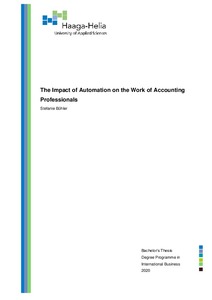The Impact of Automation on the Work of Accounting Professionals
Bühler, Stefanie (2020)
Bühler, Stefanie
2020
All rights reserved. This publication is copyrighted. You may download, display and print it for Your own personal use. Commercial use is prohibited.
Julkaisun pysyvä osoite on
https://urn.fi/URN:NBN:fi:amk-2020120426235
https://urn.fi/URN:NBN:fi:amk-2020120426235
Tiivistelmä
The aim of this thesis is to research the impact automation has on the work of accountants. Automation is one of the biggest current trends and is expected to have a significant impact on the work of many professions, including accountants. Therefore, it is researched how the work of accountants has changed in the recent years and how it is expected to change in the future.
Automation in accounting has increased in the past years. Tasks that require manual data entry or are repetitive are most likely to be automated. Automated processes can lead to an increase in quality, efficiency and productivity. However, the number of accountants can decrease and the required skills for the job change. Moreover, investing in automation requires monetary resources that smaller companies might not have. Automation can be done with several concepts ranging from cloud-based accounting and software as a service to artificial intelligence and robotic process automation and blockchain.
The research method chosen was a qualitative approach in the form of interviews. The interviews gathered data regarding recent and upcoming changes in accountants’ work as well as how these changes affect accountants’ tasks, competencies and workload. Based on this, recommendations were made.
The results of the research indicate that most changes in accountants’ work are related to manual tasks, such as accounts payable and accounts receivable. The most commonly used forms of automation are cloud-based accounting and software as a service as well as robotic process automation and artificial intelligence. The increase of automation has an impact on accountants’ work. The tasks have changed and the focus has changed towards analysing and advising. There is an increase in efficiency and productivity. Nevertheless, some challenges are faced to due automation, related to technological issues and people. Moreover, technological and interpersonal skills have become more important.
Automation in accounting has increased in the past years. Tasks that require manual data entry or are repetitive are most likely to be automated. Automated processes can lead to an increase in quality, efficiency and productivity. However, the number of accountants can decrease and the required skills for the job change. Moreover, investing in automation requires monetary resources that smaller companies might not have. Automation can be done with several concepts ranging from cloud-based accounting and software as a service to artificial intelligence and robotic process automation and blockchain.
The research method chosen was a qualitative approach in the form of interviews. The interviews gathered data regarding recent and upcoming changes in accountants’ work as well as how these changes affect accountants’ tasks, competencies and workload. Based on this, recommendations were made.
The results of the research indicate that most changes in accountants’ work are related to manual tasks, such as accounts payable and accounts receivable. The most commonly used forms of automation are cloud-based accounting and software as a service as well as robotic process automation and artificial intelligence. The increase of automation has an impact on accountants’ work. The tasks have changed and the focus has changed towards analysing and advising. There is an increase in efficiency and productivity. Nevertheless, some challenges are faced to due automation, related to technological issues and people. Moreover, technological and interpersonal skills have become more important.
